Jayser and MunEZ published the second part of their hand analysis a couple of days after the first part. We've also got that part of the High Stakes Analysis series, which featured Stefan11222.
A Perfect Bluff-Catcher?
Jasyer1337: is Sergey's hand on the button. He raises, and Bonieumiesz calls.
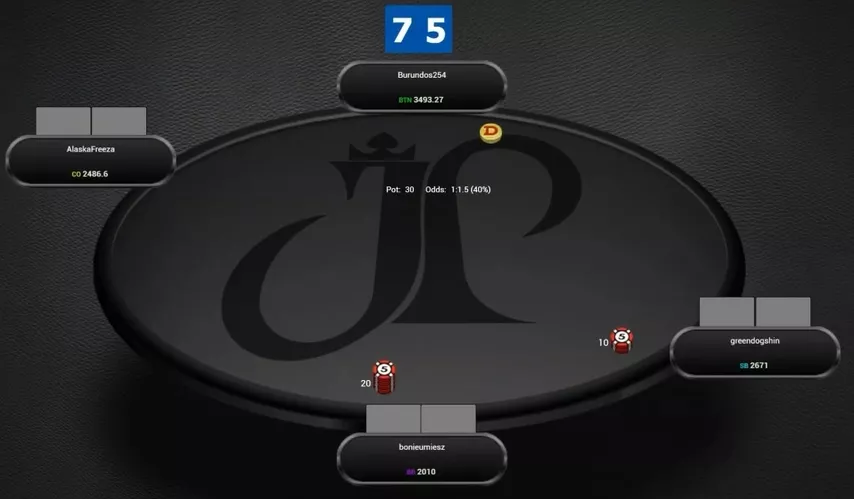
On the flop , you bet half pot, and he calls.
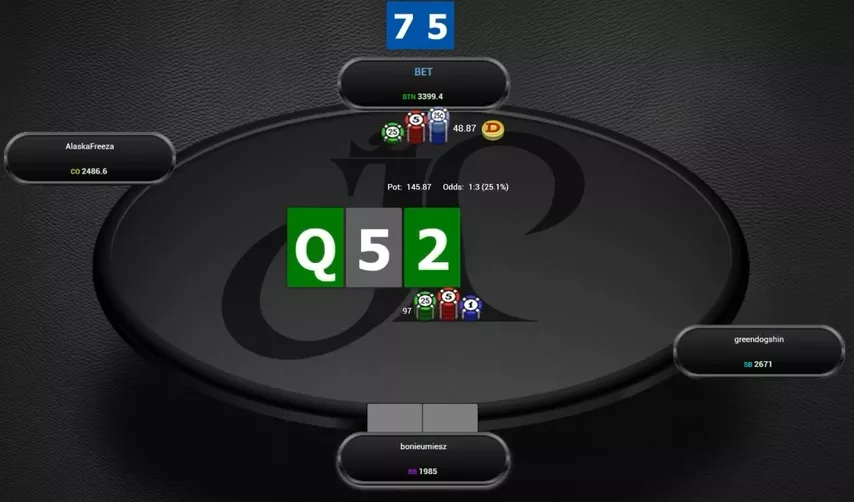
The turn is a , and you check back for showdown value—no questions asked.
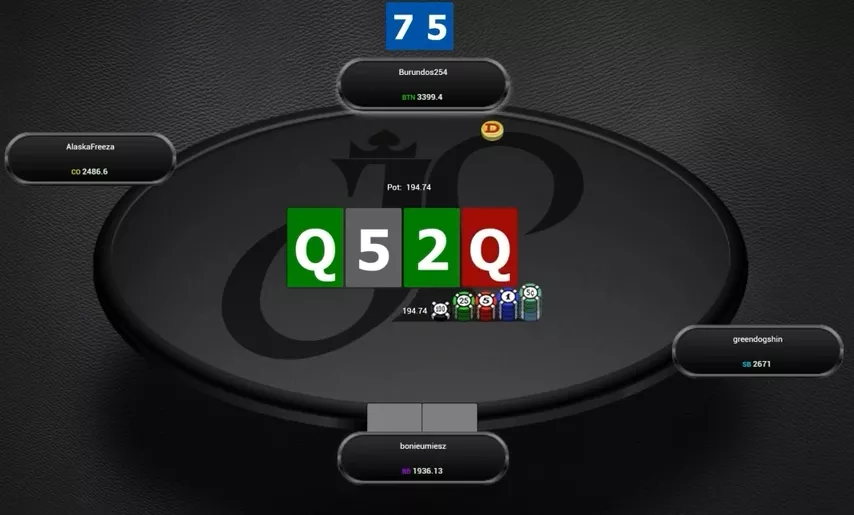
On the river, we have our , so he checks. Sergey bets two-thirds or even three-quarters and gets check-raised. Our hand looks like a nice bluff catcher with Sergey calling here.
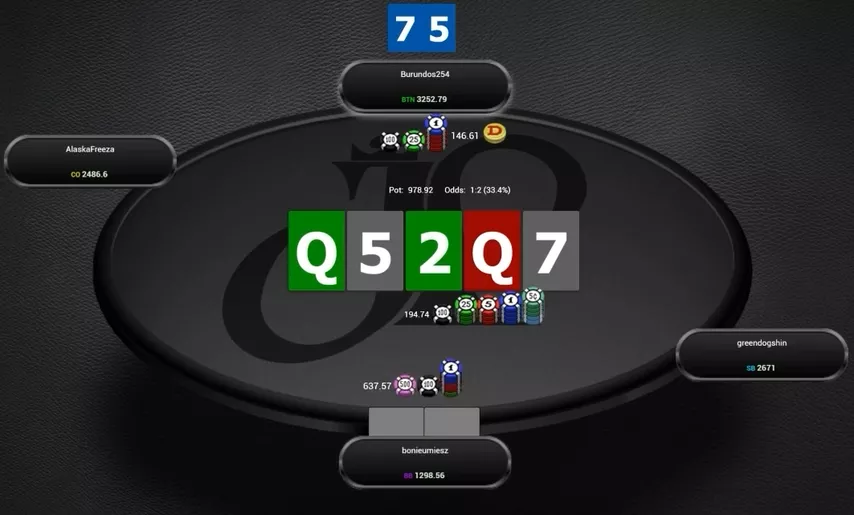
MunEZ_StaRR (Sergey Nikiforov): I actually remember this hand pretty well. Before looking at the timestamp, I didn't think it was played almost a year ago; to me, it felt like it was played just a couple of months ago. Time flies by nowadays! I clearly remember what I thought about this hand. In fact, I had analyzed our bet/3-bet ranges not long before that hand happened, and I remember that these types of hands were the best candidates for bet/3-betting river because they block a lot of the nut combos—like , , —that the villain could have.
I could definitely have some slow plays in this spot as well. My opponent is representing three or four kinds of hands, and I could have some better hands, for example, that checks back the turn because of the huge blocker effect on villain's continuing range. I could also have that decided to check behind on the turn and raise river. and are probably never in my range, but I could have some combos that are better than as well.
That is not too relevant if my opponent has three of a kind, but it is relevant if he has a full house. I would not be very happy in his shoes if I check-raised the river with pocket sevens and got jammed on because I would not beat any value at that point. So my hand would be a pure bluff catcher. Therefore, I decided to use my blockers and went ahead and put the all-in bet.
How do you feel about trying to fold out three of a kind with this play?
J: Well, first of all, it's a very nice play; I really like it. There are a few nuances to consider though—it really depends on our opponent. I'm not sure who this guy is; can you tell me a bit about his profile? I assume he's a regular.
M: Yeah, he's a strong regular. I would not say that he is too stationy or too aggressive; I think he's closer to being reasonably stationy and reasonably aggressive. So I would not expect him to always call down here with a , nor would I expect him to always bluff in spots that he perceives to be plus EV.
J: So we have a well-balanced, decent strong regular here. Speaking from a GTO perspective, our hand is obviously the best candidate we can ever imagine because we block two of his full houses—no questions asked with this hand candidate.
Now the problem I see here is when our villain check-raises trips plus; if he has pocket sevens, it's probably the number one candidate to fold against your shove because it blocks your potential bluffs and loses to full houses like and two quads.
However, most of his value hands are type hands. When he has , you’re pretty much repping just suited as one combo and suited as another combo—so just two diamond combos of value. If you think about it, his pot odds are 32%. So you need to have around 0.9 bluffs here which is quite easy to achieve.
Maybe pocket sevens could be one of those bluffs; by the way, do you ever check them back on the turn?
M: Probably not.
J: Probably never. That’s why we’re left with pretty much just two combos for value. But at the same time, what makes this bluff great is if you think about your opponent understanding how narrow your value range is; people generally don’t like to bluff when they represent a narrow range—which makes this spot two-sided and not easy at all.
M: Some people do like to bluff with a narrow range but it’s quite easy to identify those players.
J: Well, our best bluffs are suited so we have three combos there; we need to randomize 33% to play almost GTO here.
M: Not every single suited combo is equally as good for bluffing; for example, of clubs and of hearts do not block as many of our opponent's full houses as my specific combo does. So I feel that a good strategy on the river here is to obviously bet our full houses and bluff with maybe this exact combo.
J: So yeah, almost 100% of the time we should shove with this hand—maybe around 90%, approximately if we go into GTO theory deeply—and also it depends on player profiles. If you're playing against tighter players, I think we could over-bluff even with our non-premium hands; we could use any pair plus blocker and try to fold out tighter players who tend to fold more often than others.
But yeah, given our strong, balanced opponent, great play and great hands to bluff with. Did he think a lot before folding?
M: Well, he definitely had value. I remember he hesitated—maybe he was thinking it over, or maybe it was a fake thought.
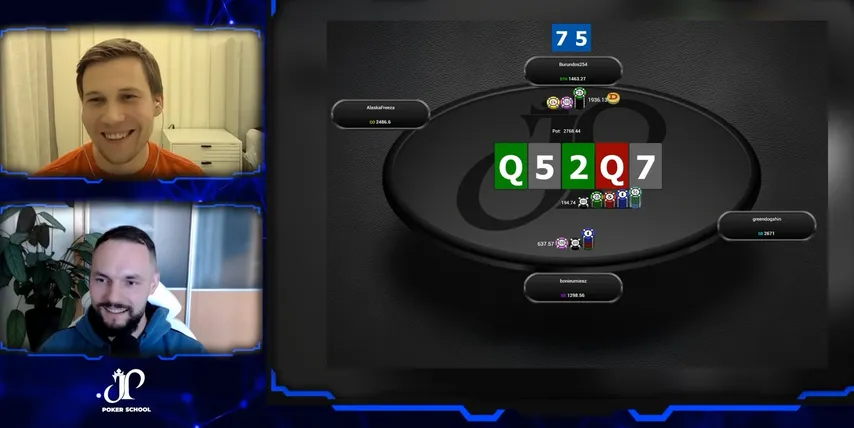
J: Well, anyway, well played. Cool hand!
"We Can Only Blame GTO if This Doesn’t Work"
Jayser: Let's see what happens here. We have a 100 BB stack and at NL5K. A 2.2 BB raise and a 3-bet to 7 BB—standard so far.
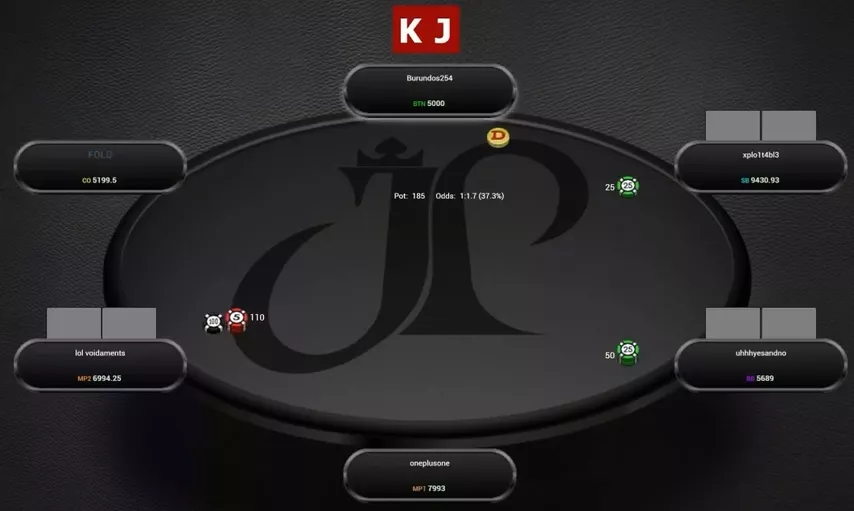
On the flop, you see a bet of one third, which is about 25%, and then you get check-raised.
His check-raise size suggests he probably represents trips plus. I don't think that ever raises here; it's more likely a polarized size, so he reps some hands.
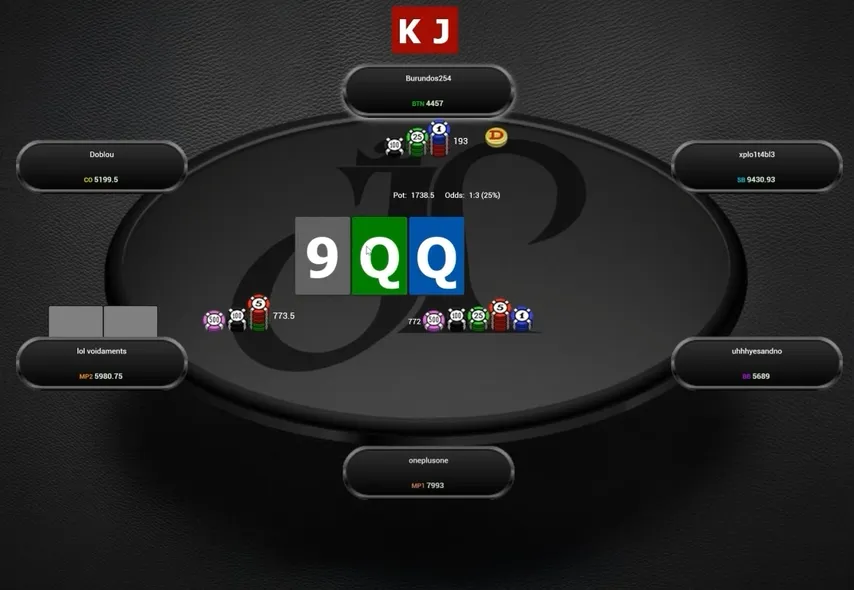
What do you think are his main candidates for value check-raising and bluff check-raising? Do you think he has offsuit at all, because this is OhhhHeyCindy from PokerStars. Back in the day he used to be quite loose, so would you give him offsuit here preflop?
MunEZ: I think that in this position, it should be mixed between four-betting and calling—probably never folding, especially against my betting size. So yeah, here he could have...
J: That’s interesting because in my standard strategy, I would four-bet or fold with offsuit in this position against a strong regular. I think this hand is indifferent if it’s mixed, but you say it’s never folding.
M: Well, I personally would never fold it.
J: Okay. I mean, he would obviously never fold either because he's probably still loose—maybe not as loose as back in the day—but anyway, let’s say he reps at least half of offsuit and suited; you block some of those. What do you think is his weakest ? Maybe suited?
M: I think he could raise with any at a certain frequency; maybe he would raise with some Queens at a higher frequency than equilibrium suggests. So yeah, I wouldn’t be surprised to see any good hand here. He might not go for stacks with but could just check-raise and then check call.
J: The problem I see here with check-calling is that we usually do that when we raise a merged range on the flop. Then on the turn, we would need to protect our merged hands and create a check-calling range. But here, I think he represents a polarized range—he says he has -plus or a draw. In such cases, it doesn’t make too much sense to check-raise with and then go for check-calling.
Why would we want to create a check-calling range? Another reason why I would never play like that—and I don't expect most players to—is that this hand does best in a calling range first; it protects our calls and doesn’t allow dominated hands to get away easily. If a ten comes on the turn or river, we stack off against always because is going to bet the flop and then check back on the turn or double barrel.
With our hand, we always get to see two cards and create two opportunities for our opponent to get dominated.
M: Question for you: how would you describe a hand like pocket sixes from our opponent's perspective? Is it a bluff, is it a merged raise, or is it both?
J: I think it's a pure bluff because when we merge raise, we need to win at least X amount of time. When we check-raise with pocket sixes, we only win against King-type hands that call and then check against our check on the turn—whereas other hands would rather bet. For example, your hand could call on the flop or or whatever; if you're getting checked on the turn, you're probably going to bluff with those hands to make better broadways fold and pocket pairs fold as well. You probably don’t want to check back and risk getting check-shoved on that board.
So yeah, I would categorize this as a pure bluff on the flop.
M: The reason I asked you this question was because let’s say pocket sixes check-raise the flop and then a very blank turn comes like a ; now suddenly pocket sixes have some showdown value. That’s why you need some hands like Queen-Ten to protect that little bit of showdown value range.
So I wouldn’t exclude hands like from his range.
J: Yeah, that's an interesting point! From a GTO perspective, I think you're absolutely right. It’s just the way I build my strategies; I expect most people to simplify their strategies too—to make them more logical and human-like—so they don’t just copy solvers without understanding why they do X or Y.
The thing is to have some check-calls on the turn; we can do that with as well because at least this is the best trips but not the best hand overall. You said that on some blanks with our pocket sixes we might need to protect our check-call—but the thing is we don’t get many blanks on a board like that...
So, , , , , , and are not blanks. A very large portion of the deck is going to be non-blank cards. I mean, not half, but a significant portion. So when those cards come, pocket sixes are going to be worthless.
M: I disagree with your last statement because when a , , or comes, pocket sixes could serve as a bluff.
J: But that’s not a merge; it’s purely a bluff.
M: Yeah, exactly. I’m saying that if pocket sixes check the flop and then the turn completes some other draws, pocket sixes become a bluff. If the turn is a blank, pocket sixes still have some small showdown value.
J: That’s an interesting point. We could probably protect our range with hands like or maybe if we want to check-raise some using a randomizer with —that could be a play. Though I still would simplify it, but yeah, it’s personal preference.
Anyway, he check-raises; we have no options but to call. The turn is an interesting card; he checks again.
Your sixes must win now!
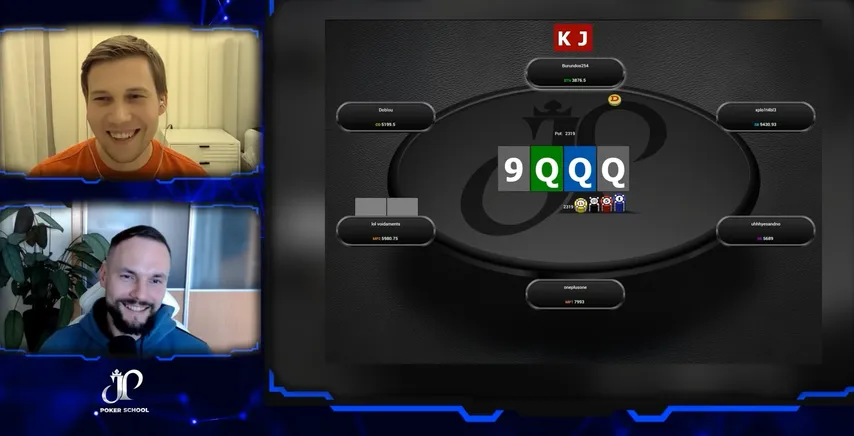
You have the best imaginable hand here to bluff with. You block his suited combos—he only has suited Queen-Jack and suited King-Queen—and you block those combos. So now when he checks, his better hands are suited (just one combo of ) or offsuit if some of those were folded pre-flop.
What’s the plan?
M: The plan is to apply maximum pressure here. It’s a very good card for our range because our Kings, Aces and Jacks have increased in value significantly. The number of strong value combos in our opponent's range has decreased considerably—not only does he have fewer combos now, but also his pocket nines have weakened.
I wouldn’t be surprised if the correct strategy here is to bet the entire range.
J: When you say apply maximum pressure with your hand, do you mean to always stack off with it no matter what happens because this is like the best imaginable blocker we could have?
M: Yeah, exactly! The perfect hand might be if he had , but I don’t think it’s a good idea to call that one
J: Yeah, probably too lose.
On the turn, I like your size; I mean it’s standard—one-fourth of the pot. He check-calls. By now his range looks like full houses with nines and some rare quads along with those pockets that bluffed on the flop. Pocket Aces is a nice check-raising candidate; I think maybe why not? When gets his straight, we could cooler him.
M: Do you think he could have some other hands that check-call on the turn? Let’s say if he has hands like or —do you think those hands would call on the turn?
J: He probably has enough equity given the size because he still has hands like at least or hands like yours. He probably cannot fold against one-fourth pot and likely wouldn’t continue betting with those hands on the turn as well. Or would he? Did you ever bet on the turn?
M: I think it's a range check.
J: Yeah, so interestingly on the river , we even have some small showdown value—very minimal—and we also split sometimes. But obviously with our hand—and also the river being the best card we could have dreamed of—it blocks his .
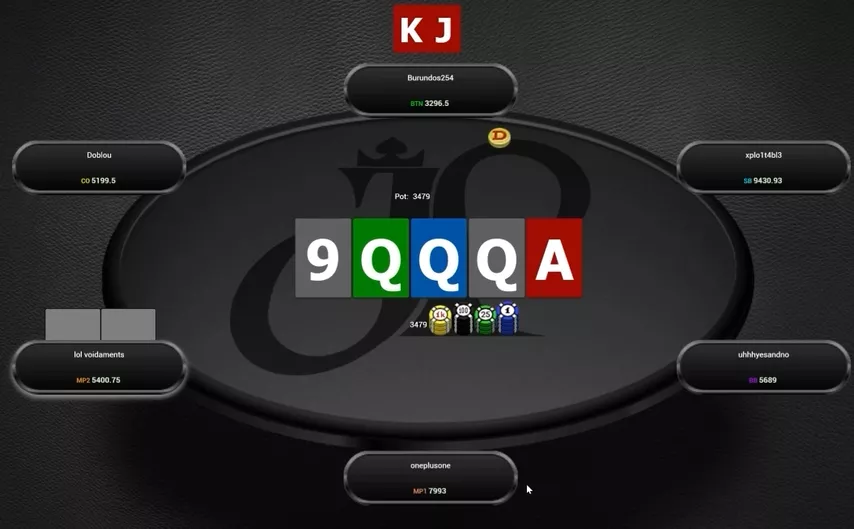
Now he donks; this is surprising!
What do you think about his donk bet?
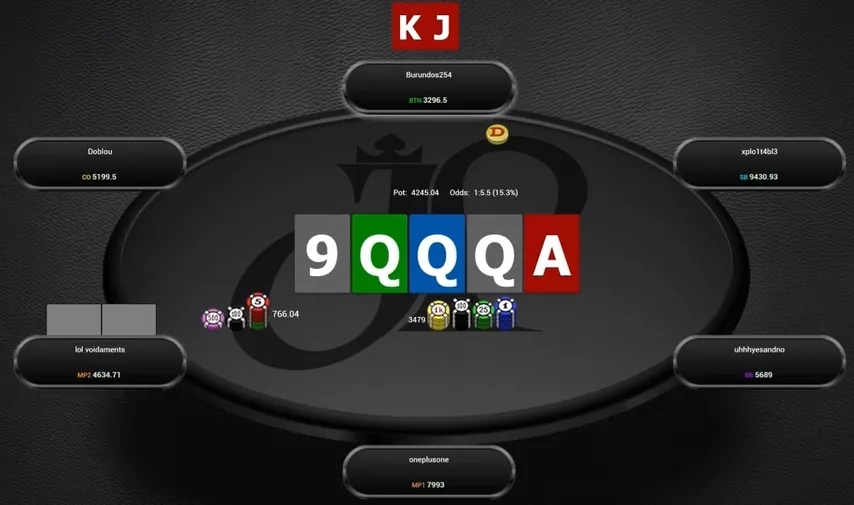
M: I asked you about those and hands for a reason; it’s actually very surprising to see this donk at this moment. When I played that hand, I thought it didn’t make sense for him to donk bet with quads for this size because if I have an , I wouldn’t bet this size because I just don’t see what it accomplishes.
Yeah, so I basically thought that it was either an somehow—like maybe —or something like that—or perhaps hands like or or .
So what would you do in my shoes?
J: That’s a nasty spot—especially given the opponent because he’s losing aggressive—probably not the best candidate to bluff against. But at the same time, it might not be the worst spot to bluff because most importantly here is that our hand is absolutely the best bluff we could imagine. If we don’t bluff this hand, we have zero bluffs left.
Even though he's loose, I still think it's going to be an incredibly tough spot for him if he has an here—it’s not an easy call at all! He could have offsuit or offsuit; at least a portion of those and suited combos as well—so you represent a realistic value range.
Your blockers are hands like yours but they ideally need to have hearts—like or —to block some of his quads. That’s not many combos given your overall value range so I think he's going to be in an incredibly tough spot if he has an —and it looks like a great spot to try and make him fold!
M: I felt the same at that time, and I didn’t expect him to have many Aces. My main idea was to fold out snap folds from those draws that he could have. I also thought it would be very hard for him to call with an in this spot because I obviously have a lot of quads here, and I could have pocket Aces as well. So yeah, I have quite a few combos of value hands, and I have the perfect bluff, so I decided to go for it.
J: Yeah. I mean, this is the best blocker we can have. We can only blame GTO if this doesn’t work and he makes the call with —well, that’s a realistic hand to expect.
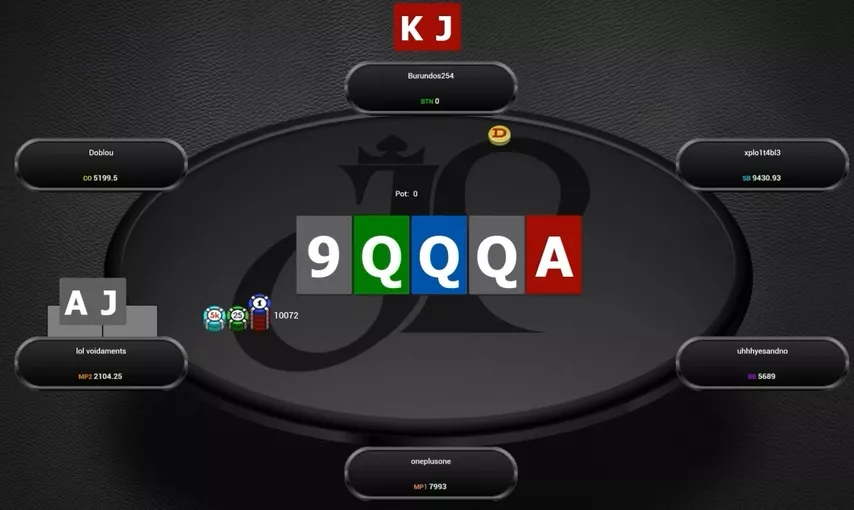
Did he take a lot of time to think about it?
M: Oh yeah, he definitely thought about it for ages.
J: Against most opponents, this is definitely a great shove—100%. But against him as well, it’s still the best candidate we could think of. I think if this hand happens again, we must do the same.
He probably used a randomizer to call you down, so our bluff was plus EV—absolutely well played! Great hand!
Out of Position Against the Best in the World
Jayser: All right, what do we have here?
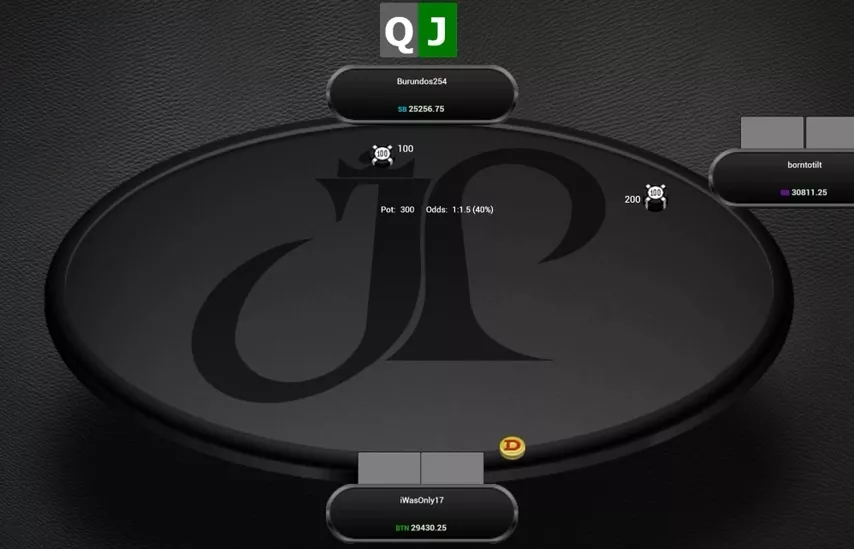
Our last hand is played on an NL20K against Linus Loeliger.. I believe this is WPN. We are 125 BB effective stacks and we are out of position against the best player in the world. We raise and get three-bet. We mix this hand; I believe we can four-bet like 25%/20% or call.
Do you ever fold Queen-Jack offsuit? Because against Linus, I think we could probably deviate and fold it here. I like the idea of over-folding in such spots when we feel like our villain has an edge postflop.
Maybe that’s what I would feel. His game is way better than mine, so folding is not off the table.
What do you think?
MunEZ: I think this hand is marginal at best. You can definitely fold it, but maybe at the time I played that hand, I wasn’t in a folding mood, and I decided to call. In general, I would mix it across three options: fold it sometimes, 4-bet sometimes, call sometimes.
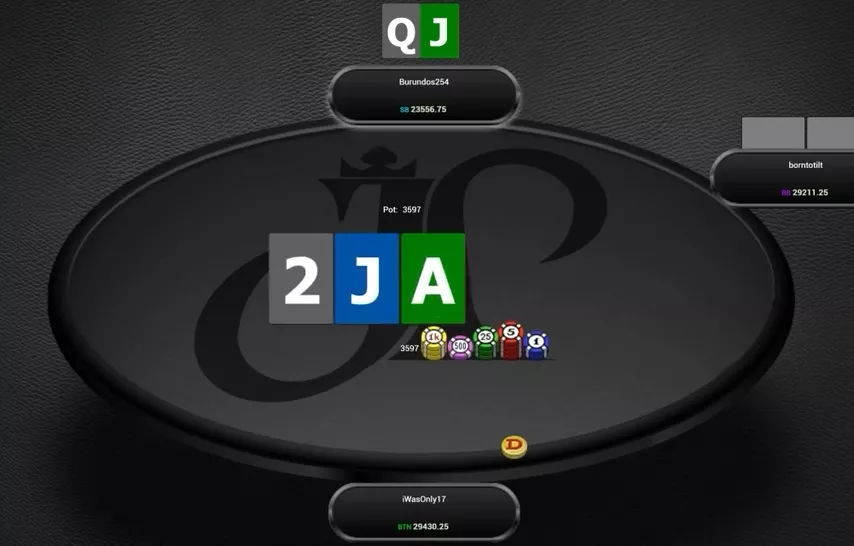
J: Let’s see what happens! So we call. The flop goes check; he c-bets about 20% of the pot.
Do you ever consider check-raising with this hand?
M: Not with this exact one; maybe you could check-raise a hand that has a cleaner backdoor like or —especially with backdoor flush draws—but mainly I would call. Maybe once in a blue moon you could randomize a check-raise.
J: We have some better candidates like suited and pocket fours, pocket threes, pocket fives. This is not the board where we check-raise much; we lack strong hands like sets, etc.
All right, so we call and the turn is an interesting card.
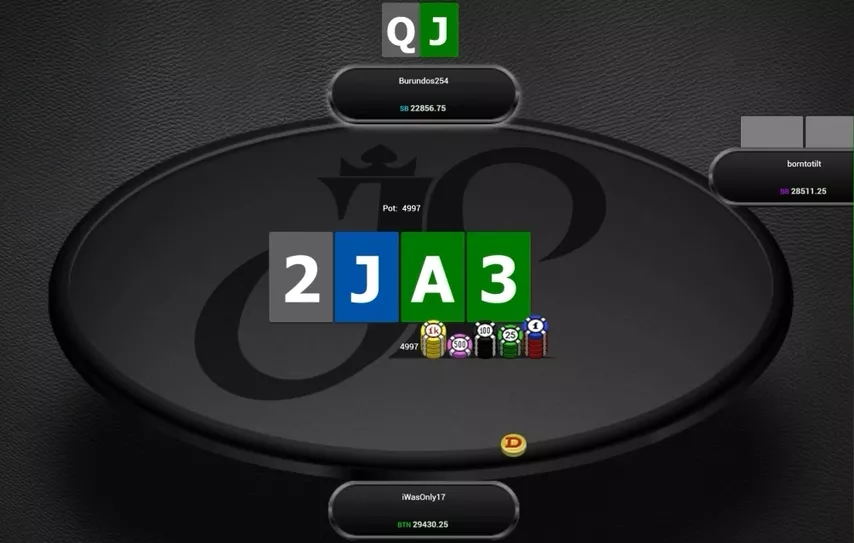
It helps our range probably slightly better than his range but just slightly overall—it’s more like a blank. He bets again; it’s a reasonable size given the stacks—if we were 100 BB effective, three-quarters would probably be the standard size.
M: This isn’t an easy size to play against; I think we don’t have enough top pairs and good draws to continue in this spot, so we have to add some weaker hands. If we choose between all the and combos that we could have, your best ones are with the because when we have it, we will hit non-flush three-of-a-kinds more often than if we don’t have a backdoor flush draw.
So yeah, I decided to call with this hand some of the time—it’s great! Maybe every single time considering that I've folded it sometimes before.
J: That’s a great point you've touched on: having with makes it one of the best calls. But what if you have with ?
M: I think that’s a way worse hand because I feel like he should bluff a lot with . Let’s say if he has with or with —those are good candidates for bluffing the turn because they can bluff , , and that always continue.
By having in our hands, we significantly block his bluff region—that's why we should fold that hand pre-flop.
J: Yeah, and I’m also wondering about ; that makes another worse calling candidate on the turn even though we might seem to have a medium pair top kicker since we block his offsuit Kings that almost always bluff on the turn and always bluff on a river.
M: If you had to compare my hands in these exact situations—let's say versus —what would you guess has higher equity in calling?
J: Honestly? I would fold here; I wouldn’t consider it. I think they have very close equity here but here’s the problem with ...
If the turn came a six, for example, we would have more hands in our range that would become folds, like pocket fours and pocket fives. But when comes on the turn, our fourth and fifth pairs—the ones we didn’t check-raise on the flop, which is the majority—must continue now. This means that we could fold more of our medium pairs since they have less equity than the better candidates. So I would not consider ever calling with .
M: I’m not sure that it’s an easy call with pocket fours and pocket fives against the pot size.
I see one problem with this play: let’s say our opponent has pocket Kings or pocket Eights. If we call with pocket fours and pocket fives instead of all the time, then it would incentivize our opponent to bet those third pairs as bluffs because they would benefit from folding out second pairs and they would also get called by third pairs that they beat.
I imagine that in equilibrium, pocket fours and pocket fives are called some of the time, while middle pairs and top pairs are almost never folded. I really wanted to bring that up because check-raising is so small on the flop; our continuing range was wider than under normal circumstances. That means that on the turn, our top pairs...
J: -Fours and fives, we can randomize with as well. So you would also randomize that hand—not 100% fold?
M: Yeah, and should be mixed; maybe I’m wrong.
Jack-Nine is probably a fold, but once again, it’s not obvious. Let’s say versus —what do you think is better?
J: It’s not that obvious because blocks his that is going to bet on the turn and then maybe value bet on the river. Whereas if we have ourselves, we block his value hands but at the same time if a comes on the river, then the potential gutshot closes and we could expect more check-check backs because our two pairs make this board look scary. If he has and the river comes , it’s not like we’re getting value.
M: Exactly! Jack-Nine has more implied odds in this scenario.
Yeah, I would think that performs worse than in this case.
J: I love your analysis—the way you mentioned this idea about the difference between Jack-Nine and Queen-Jack when we have the Jack of Clubs compared to the Queen of Clubs is really interesting.
Now on the river—what could go wrong?
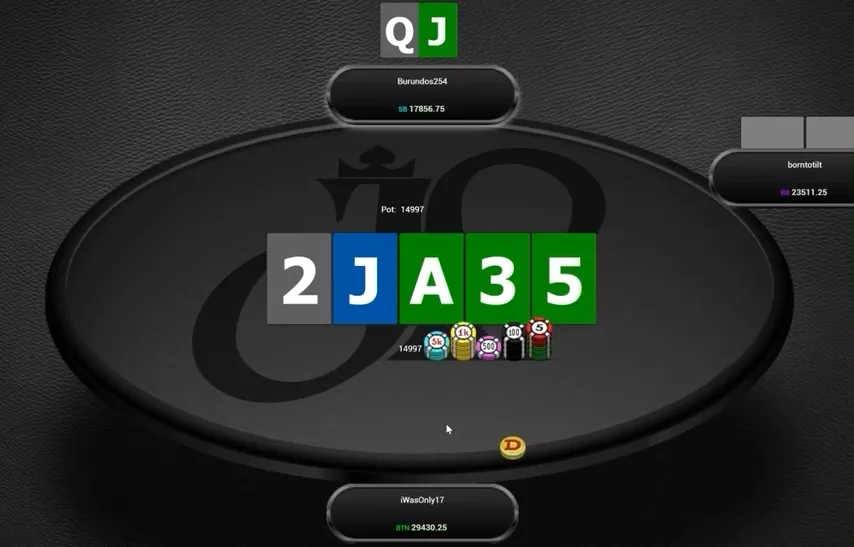
What do you think about this river? It’s a very interesting card.
M: I think it’s perfect for us, especially for our hand because it blocks a lot of villain's value hands. If we consider jammings here, it blocks , it blocks .
Imagine you are in his shoes with a hand like or —and bear in mind that three-quarters of those hands have no —and you face a donk jam on the river which is more than a pot-sized bet. How happy would you be with those hands?
J: That would be a disaster! Also, if you think about ranges, how many flush draws does he potentially have from the big blind? He doesn’t have that many suited ; he only three-bets the best ones pre-flop. The hands with Jacks just check back on the turn, so no Kings or suited flush draws—and no Jacks either. Suited Queens are not even three-betting at least in GTO pre-flop; only the best ones very rarely.
So he has type flushes or or type flushes but there’s a very small percentage of those hands that three-bet pre-flop. If you think about range versus range—who has more flushes? Obviously he doesn’t have those hands.
If you play against anybody but Linus—I mean against top ten players—we can over-bluff here immensely on the river. We can just donk bet immensely because it would be so hard for him to call from the big blind; he never has those flushes. If he doesn’t think about us knowing how weak his range looks like, then he could really over-fold and not call enough.
M: Do you ever consider bluffing to have like in this spot?
J: I’ll say this: if the wasn’t of —if there was let’s say or s and —then I would over-bluff here a lot because I’ve analyzed these spots. When there is an on the board and flush draws close—and if that Ace isn’t of clubs—then the small blind has a gigantic range advantage because he has all his suited Aces from to —some of them four-bet Ace-Queen—whereas big blind only has the best suited Aces and a small portion of Aces like or which gives a small blind a huge advantage.
So then I would over-bluff a lot. Here with , I'm not sure to be honest...
With , probably not. I mean, I wouldn't do that in-game, but I would definitely analyze this hand afterward and see how wide we can spew here.
M: The reason I asked about is that we don’t really have that many certain pairs that we could turn into a bluff. Of course, we have and with the —those are three combos and some combos that are not folded or four-bet pre-flop. Maybe some and as well. If we want to donk all of our straight-plus hands on the river, maybe that's not enough.
J: I agree; it’s not enough. Instead of , I’d rather go for a hand like because we have so many flush draws in our range, and they are equal. I mean, loses as much as on showdown.
M: That’s a very good point!
J: Let’s see how this scary hand ends. So we donk bet with confidence; you know we have no reason to worry about it, but we’re playing against Linus, which makes the situation quite harder.
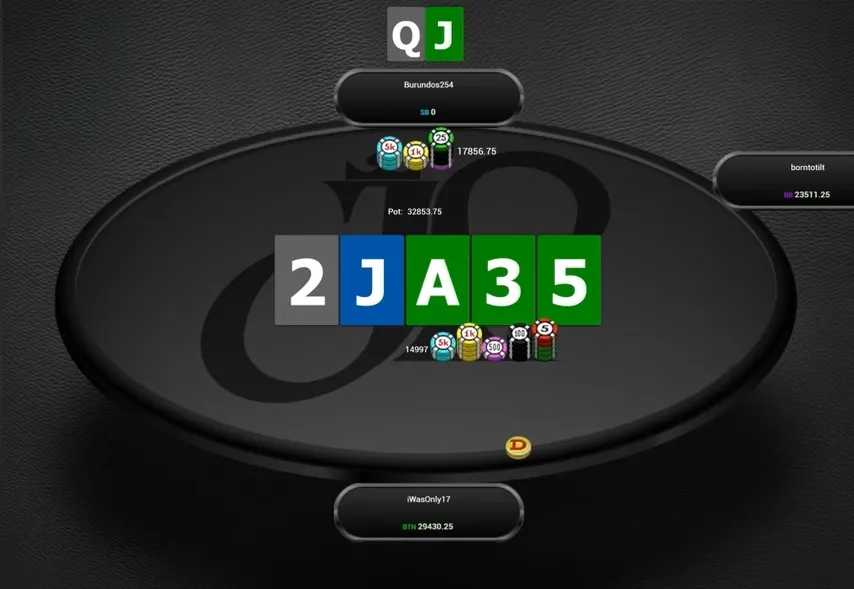
M: Yeah, we block quite a bit with our combos.
J: And you made him fold – was it a fast fold?
M: It was a fast fold! He thought about it for a moment—again, you never know whether he was fake thinking or really considering it.














